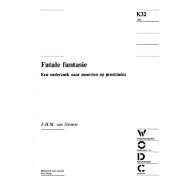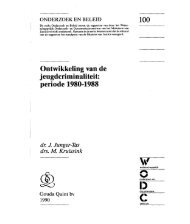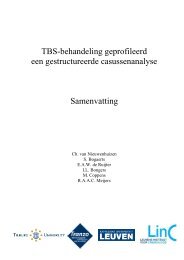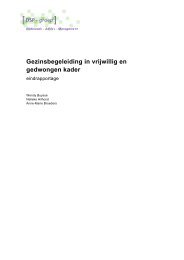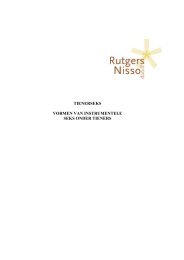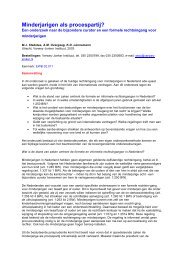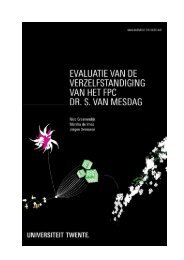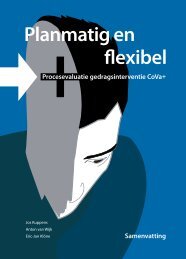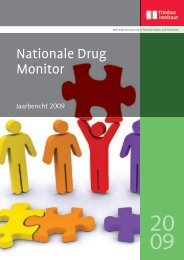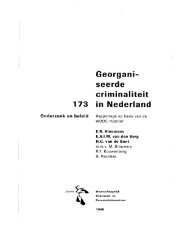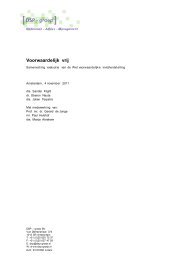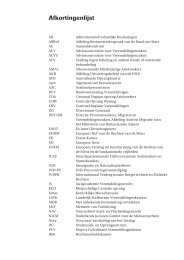Wet Koop onroerende zaken; de evaluatie - WODC
Wet Koop onroerende zaken; de evaluatie - WODC
Wet Koop onroerende zaken; de evaluatie - WODC
You also want an ePaper? Increase the reach of your titles
YUMPU automatically turns print PDFs into web optimized ePapers that Google loves.
MOLENGRAAFF INSTITUTE FOR PRIVATE LAW<br />
<strong>de</strong>al of anxiety and uncertainty on the part of the seller. Moreover, protection against impulsive <strong>de</strong>cisions<br />
is already realised by the written form requirement.<br />
1.4 Answers to the sub-questions<br />
1. There is a sufficient reason to extend the application of the requirement of a written form. First, the<br />
written form requirement should be applicable as soon as a person not acting for professional persons is<br />
involved (regardless of whether this is the buyer or the seller, and regardless of the nature of the object).<br />
Secondly, there is also a sufficient reason to extend the requirement of written form to all sales agreements<br />
regarding immovable property, including business property and professional buyers. This would prevent<br />
problems relating to <strong>de</strong>limiting the scope of the Act and would also prevent an unequal position between<br />
the professional and the non-professional buyer; it also serves the legal certainty of the parties involved as<br />
well as legal certainty in general.<br />
2. With a view to the goal of allowing a non-professional buyer to consult experts after the conclusion of<br />
the sales agreement, the protection offered by the cooling-off period is not sufficient. The cooling-off<br />
period does grant some protection against impulsive <strong>de</strong>cisions by buyers, but consi<strong>de</strong>ring the protection<br />
already offered by the requirement of a written form with regard to this point, the cooling-off period has<br />
little to add.<br />
The Vormerkung in principle reinforces the right of the buyer to actual performance; however, the rule<br />
raises a number of questions and several si<strong>de</strong>-effects, such as an (overly) far-reaching breach of the<br />
principle of paritas creditorum.<br />
3. The 5% rule offers a good basis for the protection of a non-professional client, but its application raises<br />
a significant number of questions.<br />
4. There is a sufficient reason to replace the cooling-off period with obligatory intervention by a notary<br />
during the phase when the parties enter into the agreement.<br />
5. Points of <strong>de</strong>parture for the prevention of fraud can be found concerning the various actors who are<br />
involved in the sale of a home: inter alia estate agents, assessors, mortgagees and notaries. All actors<br />
involved in the process should have the necessary instruments to allow them to fulfil their responsibility in<br />
this area. Adding to this, the auction procedure can be revised.<br />
In the following, the main results regarding each investigated topic are presented: the requirement of a<br />
written form, the Vormerkung, the 5% rule, the position of the notary and fraud in the sale of real estate.<br />
2 The requirement of a written form<br />
2.1 General findings<br />
Interviews and questionnaires show that the introduction of the requirement of a written form in article<br />
7:2 of the Civil Co<strong>de</strong> has been well received by all the parties involved. Doctrine has also approved of this<br />
requirement.<br />
Buying a home is a complex and far-reaching agreement. It is difficult to oversee the obligations that one<br />
assumes. Laying down the agreement in writing means security with regard to the content and (when applying<br />
a strict approach) certainty with regard to the moment when the contract is conclu<strong>de</strong>d. Not merely<br />
the parties involved, but also society in general benefits from clarity with regard to the legal status of immovable<br />
property, which is served by the requirement for a sales contract to be in a written form.<br />
From a practical point of view, as a result of this written form requirement, both the buyer and the seller<br />
have more time to consi<strong>de</strong>r the transaction before it is put down in written form. The written form also<br />
242



